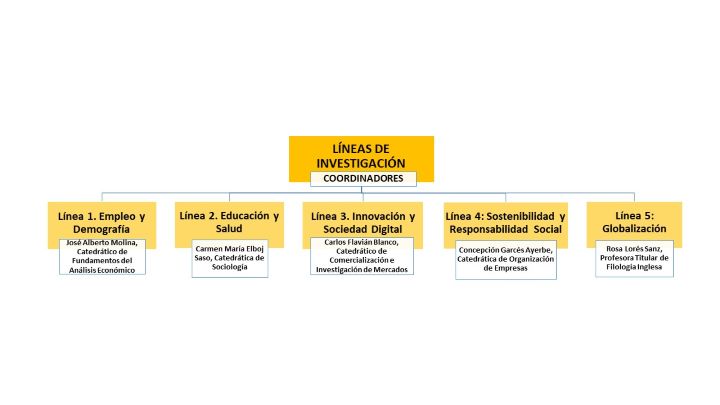RESEARCH LINES

EMPLOYMENT AND DEMOGRAPHY
Coordinator: José Alberto Molina, Full Professor of Economics
Line 1 addresses trends and possible changes in the labor market together with demographic evolution. Europe 2020, as the EU's growth strategy for the 2010-2020 period, set the first key objective of improving employment in Europe through a series of initiatives that specifically include consideration of youth, aging, and gender equality. This approach is maintained in the new Horizon Europe for the 2021-2027 period, in which two of its three priority objectives include stimulating employment by responding to citizens' priorities.
In this line, we propose a body of research that provides solutions to improve the prospects for employment in a global changing environment. This analysis should encompass economic and labor policies, as well as the design of business strategies to enhance employment indicators in quantitative and qualitative terms.
- Issues to be approached:
- Employment: theory and evidence
- Employment: regulation
- Territory, population, and mobility
- Welfare, efficiency, and equity
EDUCATION AND HEALTH
Coordinator: Carmen Elboj. Full Professor of Sociology
Education and health are two key stimuli for employability and, consequently, for the well-being of individuals. The Framework Program for Research and Innovation for the period 2021-2027 reinforces jobs and competitiveness in Europe through a proposal called Global Challenges and Industrial Competitiveness, whose first action cluster is Health. Previously, the Europe 2020 strategy clearly identified improving the performance of education, training, and youth accession to employment, as well as designing an agenda for new jobs and qualifications through the promotion of training for workers.
Issues to be approached:
- Education and training throughout life
- Educational skills for employment
- Health as a determinant of competitiveness
- Poverty and social integration
INNOVATION AND DIGITAL SOCIETY
Coordinator: Carlos Flavián. Full Professor of Marketing
One of the basic proposals of the new Horizon Europe 2021-2027 program is the development of innovation, focused on identifying digitization as one of many global challenges in the search for industrial competitiveness. The development of the digital society is motivating the transfer of a large part of the information and activities carried out in the traditional physical context to the new digital context, and the extraordinary proliferation of various forms of innovation. In this line, the Institute intends to address a range of aspects related to the new challenges of the digital society, the socioeconomic and legislative changes that are promoting the multiple and diverse applications of these new information and communication technologies, and the analysis of the new ways of managing relationships, established within and among organizations.
Issues to be approached:
- New challenges in digital society
- New applications of technology in digital society
- Innovation in organizations
SUSTAINABILITY AND SOCIAL RESPONSIBILITY
Coordinator: Concepción Garcés. Full Professor of Business.
In the European Research Strategy 2020, sustainability was linked to competitiveness, expressing support of sustainable management, but maintaining the necessary competitiveness. This concept is once again present in Horizon Europe 2021-2027.
When certain levels of well-being are reached in developed societies, the need to find a balance between material wealth and emotional wealth emerges. In this context, the creation of economic, technological, and social value requires responsible development, with the full participation of all those involved. At the same time, the proposal should be compatible with environmental sustainability, with the ethical values of participants, and with the individual rights of opinion, participation, knowledge, transparency, and privacy. From this conceptual framework, the Institute will pay heed to some of the most important challenges for developed societies.
Issues to be approached:
- Sustainable resource management
- Corporate social responsibility (CSR)
- Alternative forms of political participation and economic management
GLOBALIZATION
Coordinator: Rosa Lorés. Full Professor of English Philology.
Globalization is the term that best describes today’s environment when talking about economies and societies around the world. Thus, Horizon Europe 2021-2027 identifies global challenges and industrial competitiveness as essential concerns. The concept of globalization is usually referred to as a process of exceptional growth of economic relations among different countries, a scenario in which commercial and financial exchanges supersede national incomes, and institutional obstacles to relations are limited. In short, a time when the interdependence among nations seems to narrow significantly in the economic sphere.
Interdependence reaches many other areas, such as mass migration, the depletion of certain natural resources, the preservation of the environment, and the containment of the dire effects of climate change. And in the cultural sphere, contacts have been strengthened through migration, tourism and travel and, above all, through new communication networks, such as the Internet.
The analysis of the current economic, social and cultural reality cannot be done without its contextualization in the framework that we call globalization.
Issues to be approached:
- Commercial, financial, and business internationalization
- The governance of globalization
- Culture and communication in a globalized world
- Participation, justice, and protection of rights in a globalized context
